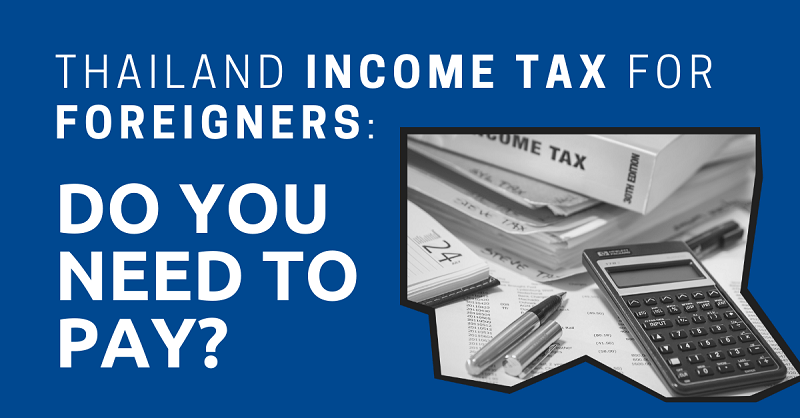
When it comes to Thailand income tax for foreigners, there’s a lot of misinformation floating around on the internet.
Some expats will tell you that they never pay income tax. Others, however, will tell you that they file every year. Who should you listen to?
Then there are the tax rates. If you do have to file personal income taxes in Thailand, what percentage will you be taxed?
So many questions that need reliable answers.
With that in mind, this guide will help you determine if you’re a tax or non-tax resident in Thailand, what your tax rates in the country are, and how to file your personal income taxes.
"*" indicates required fields
Disclaimer: This article may include links to products or services offered by ExpatDen’s partners, which give us commissions when you click on them. Although this may influence how they appear in the text, we only recommend solutions that we would use in your situation. Read more in our Advertising Disclosure.
Contents
- Do Expats Pay Income Tax in Thailand?
- Tax Residents Vs. Non-Tax Residents
- Personal Income Tax Rates
- Dividends and Bond Tax Rates
- Rental Income Tax
- Withholding Taxes
- Tax Deductions and Allowances
- Filing Taxes
- Tax IDs
- Double Taxation Agreement
- Are Pensions Subject to Tax?
- Digital Nomad Tax Liabilities
- Does Thailand Tax Foreign-Earned Income?
- Thailand Income Tax Calculator
- Corporate Income Taxes
- Now, on to You
Do Expats Pay Income Tax in Thailand?
As an expat working in Thailand, the most common type of tax you’ll have to pay is personal income tax.
Even digital nomads who work remotely in Thailand might have to pay income taxes.
Keep in mind, Thailand is not a tax haven. So if you plan on living here without encountering any legal issues, you have to make sure you file taxes on any liable earnings.
To determine if you have to pay taxes in Thailand, you first need to find out if you’re a tax resident in Thailand.
Please note that everyone living in Thailand pays taxes. It comes in many forms. The most outstanding tax is VAT (value-added tax), which is charged at 7 percent on most products and services in Thailand.
Tax are also hidden in every service and product you get in Thailand. If you buy a condo, you have to pay condo tax. If you own a car, you have to pay car tax every year.
Tax Residents Vs. Non-Tax Residents
Expats in Thailand fall into two categories:
- Tax residents
- Non-tax residents
A tax resident is anyone who lives in Thailand for 180 days of a calendar year. Anyone shy of that number is considered a non-tax resident.
This important difference in residency classification means there is also a difference in what income is taxable.
Tax residents must pay taxes on any income they earn in Thailand as well as a portion of any income brought in from overseas as noted in Section 1 of the Revenue Department’s website.
However, any income you earn during the year but leave in a bank account outside of Thailand is not subject to taxes.
This means, if you make money abroad and don’t want to pay income taxes on it in Thailand, you must leave the money in a foreign bank account and send it to Thailand during the next calendar year.
This also applies to pensions, but we’ll talk about that in greater detail in a section below.
In comparison to tax residents, non-tax residents are only liable for income that is earned in Thailand. This means your income from foreign sources aren’t taxed.
Please do note that to legally be a tax resident in Thailand and pay Thailand income tax, you need to get a Thailand tax ID from your local Revenue Department. If you are working in Thailand, you employer will do it for you.
Also, be aware that in order to work and get paid from a company in Thailand, you must have a Thai work permit.
Personal Income Tax Rates
Thailand has a progressive tax system, which means your tax rate increases as your income increases.
You must pay taxes once you earn more than 150,000 baht a year after tax deductions. Then, the more you make, the higher tax rates you have to pay.
At present, the maximum tax rate is 35 percent for those who make over 4,000,000 baht a year.
The table below shows what your tax rates will be at different incomes.
| Taxable Income (THB) | Rate | Taxable amount (THB) |
| Less than 150,000 | 0 | 0 |
| 150,000-300,000 | 5% | 7,500 |
| 300,000-500,000 | 10% | 20,000 |
| 500,000-750,000 | 15% | 37,500 |
| 750,000-1,000,000 | 20% | 50,000 |
| 1,000,000-2,000,000 | 25% | 250,000 |
| 2,000,000-4,000,000 | 30% | 600,000 |
| More than 4,000,000 | 35% | – |
As you might’ve noticed, tax rates are comparable to most other countries, so the assumption that Thailand is a tax haven is untrue.
The main source of personal income tax for expats in Thailand is through employment.
Note that if you work for a Thai company with an International Business Center (IBC) status, have a tax-residency status in Thailand, make a minimum annual income of 2,400,000 baht, your personal income tax rate is going to be a flat 15 percent.
Dividends and Bond Tax Rates
Besides any income you earn from your employment in Thailand, you will also be expected to pay tax on other earnings.
This includes but isn’t limited to capital gains, investment income, dividends, interest, and rental income.
The table below shows you the different tax rates for these situations.
| Type | Rate |
| Dividends | 10% |
| Bond | 15% |
You only have to pay taxes on earnings from dividends and bonds at either 10 percent or 15 percent, respectively. They aren’t subject to personal income tax.
Rental Income Tax
If you have rental income, it is subject to personal income tax at the rate of 0%-35%, as mentioned earlier in the previous section. But you can also claim a 30% tax deduction on your rental income.
In addition to that, your property is also subject to property tax at the rate of 0.02% to 0.1%, based on the type of your property.
Withholding Taxes
Thailand has a tax withholding system where your employer, payer, or financial institute withholds a percentage of your income from each paycheck and submits it to the Revenue Department.
If it’s an income from employment, the withholding tax rate will be calculated based on your annual income from the progressive tax rate chart mentioned earlier.
Your total annual tax due at the end of the year will then be divided by the number of payments – for example 12 if you get paid once a month – and this is how much taxes will be deducted from each of your paychecks.
| Type | Rate |
| Employment | 0-35% |
| Rents and prizes | 5% |
| Service fee | 3% |
| Advertising fee | 2% |
| Dividends | 10% |
| Interest | 1% |
| Royalties | 3% |
Although your payer withholds your taxes and pays them on your behalf, you should always ask for withholding tax certificate, which is necessary for filling your personal income taxes.
Tax Deductions and Allowances
To decrease taxpayers’ burdens, Thailand has a number of deductibles and allowances available to both Thais and expats.
Major deductions include:
- Employment income
- Copyright income
- Income from renting out buildings, agricultural land, vehicles
- Liberal professions income
On top of that, the Thai government also allows a number of allowances when calculating total taxes such as but not limited to:
- Personal allowance
- Spousal allowance
- Child allowance
- Education
- Parents allowance
- Health insurance premiums
- Life insurance premiums
- Home mortgage interest
- Charitable contributions
The deduction and allowance rates and amounts for different income sources vary.
This table shows popular deductions for expats:
| Type | Amount (THB) |
| Personal allowance (available to everyone) | 60,000 |
| Employment | 100,000 |
| Spouse allowance (if your spouse doesn’t have an income) | 60,000 |
| Child allowance per person | 30,000 |
| Parent allowance per person (both you and your spouse) | 30,000 |
| Health Insurance | 25,000 |
| Super Savings Fund | 30% of your income but not exceeding 200,000 baht |
| Social Security | Same amount you contribute |
| Donation | Same amount you donate but shouldn’t exceed 10% of your income |
| Rental Income | 30% of your annual rental income |
Note that deductions are subject to change every now and then. You can check the Revenue Department website for the most up-to-date rates.
Taking advantage of the allowances and deductions the Thai government provides can save you money on taxes, so it’s definitely in your best interest to make the most of them.
Non-tax residents are also eligible for some personal and specific allowances.
Filing Taxes
For most people, personal income tax filing starts on 1 January and is due by 31 March of every year for any income earned in the previous year.
The tax year ends on 31 December and starts on 1 January of every year.
You can file your taxes online through the Revenue Department E-Filing system.
Here’s a list of what you need to file taxes in Thailand:
- Tax ID (see next section on how to get your tax ID)
- E-filing account (you can register once you have a Thai tax ID)
- 50 tawi (for those who are employed in Thailand – your employer will give you this)
- Withholding tax certificate
- Deduction evidence such as receipts, SSF certificates, and so on.
If you work in Thailand, your employer may help you file your taxes.
If you file your own taxes, ask your Thai colleagues or an accountant for help since the tax filing form is only available in Thai.
Otherwise, once you log in to the E-filing system, you have to take the following steps:
- Add your personal address in Thailand
- Choose your source of income
- Specify how much you make for each income type, including how much tax is already being withheld
- Choose deductibles and specify amount
Please note that you need to choose the source of income correctly through the official code.
For example, if it’s income from employment, it’s Section 40(1). If it’s income from subletting your condo, it’s Section 40(5).
Then, the system will show you how much tax you have to pay or how much of a tax return you’re going to get.
You can pay your taxes by credit card or through a local wire transfer.
If you get a tax return, you can ask the Revenue Department to send a check to your address or you can donate it to a political party.
Your local Revenue Department should be your only point of contact when it comes to taxes in Thailand.
It can take anywhere from under a week to a few months to get your tax return depending on when you file.
If you file early, there’s a chance that you’ll get your tax return within a week or two.
If you file late in March, then it could take more than two months to get your tax return.
After you file your taxes, the Revenue Department may ask you for more documents. If they do, you can upload requested documents through the system – and you should be good to go.
You can track your tax filing status on the E-filing website.
Also, keep a copy of your tax filing because you’ll need it when renewing your work permit.
If you earn advertising fees, are employed in public entertainment, or have rental income, you’re also required to file a mid-year tax return by September 30th.
With all that said, when filing personal income taxes, consult with an accountant to make sure that you can plan your taxes in advance and file them correctly to prevent any fines and/or penalties.
Tax IDs
To file your tax returns, you’ll need to register for a tax identification number.
You can apply for a tax ID at your nearest revenue office with your passport or identity card, proof of address, and an application.
If you work in Thailand, your employer will register for a tax ID on your behalf, but either way it must be done within 60 days of receiving your first paycheck.
Double Taxation Agreement
Over 50 countries have double taxation agreements with Thailand to ensure you won’t be taxed twice – once by Thailand and again by your country of origin.
The United States, Canada, the United Kingdom, Australia, New Zealand, Germany, Norway, Russia, are a few of the countries that have such treaties in place.
You can see a full list here.
However, even if Thailand has a double taxation agreement with your country, you might still have to file personal income taxes in your home country.
For instance, U.S. Citizens have to file in both countries in which they can do it using a tax filing software such as TurboTax.
To do this, you must get an English tax certificate from your local Revenue Department.
Are Pensions Subject to Tax?
Pension and taxes in Thailand are tricky, and it’s a hot topic for those who retire in Thailand.
Generally, there are three scenarios.
Scenario one: your pension is taxed in your home country. You don’t have to pay tax on in Thailand because of the double taxation agreement.
Scenario two: your pension isn’t taxed in your home country. If you transfer it to Thailand on the next calendar year, you don’t need to pay taxes on it.
Scenario three: you bring your pension into Thailand. You must declare your pension income and pay taxes on it.
However, the reality is that Thailand doesn’t seem to be enforcing this law.
Some expats went to the Revenue Department to find out whether or not they need to pay taxes on their pension.
They received similar answers, which is that you don’t have to pay income tax on your pension if you’re a retirement visa holder.
This is another reason why Thailand is a good place for retirees.
Just be aware that the letter of the law is that pensions are taxed, but a lot of people have been turned away at the tax offices.
Digital Nomad Tax Liabilities
Digital nomads are in a bit of a gray zone when it comes to tax liabilities in Thailand.
If you’re a tax resident, you have to pay taxes for all income made in Thailand and any foreign income you brought into Thailand during the year.
However, you can’t make income in Thailand without having the right visa and work permit. To avoid this issue, most digital nomads in Thailand who stay in Thailand for more than 180 days a year work for companies that are outside of Thailand and get paid abroad.
It’s not entirely legal. But there is nothing much they can do at the moment.
Although you may not need to pay Thailand income tax, you still have a tax liability and need to pay your taxes somewhere.
Does Thailand Tax Foreign-Earned Income?
In September 2023, Thailand implemented a significant change in its tax policy regarding foreign-earned income.
Previously, foreign-earned income was not subject to Thai tax as long as it was not brought into Thailand within the same calendar year.
However, following the recent announcement, all foreign-earned income is now subject to Thai tax. If you have already paid taxes on that income in your home country, there is a chance that you may not need to pay it in Thailand due to the double taxation agreement.
Currently, we are in a transition period. Everyone is awaiting detailed guidelines from the Thailand Revenue Department.
On November 20, 2023, they released a new announcement stating that foreign-earned income earned before January 1, 2024, will not be subject to Thai tax if brought into Thailand. However, you need to provide evidence of when the income was earned.
If you are considering transferring money to Thailand now, it is advisable to consult with a tax advisor to determine whether your income will be subject to Thai tax.
Thailand Income Tax Calculator
If you’re working in Thailand, the best way to figure out your taxes is to talk to your accountant and ask them to help you calculate your personal income taxes.
You can also find out how much taxes you have to pay each year by looking at your total salary. Usually, your taxes will be automatically withdrawn from your weekly or monthly salary.
For example, if your salary is THB50,000 but the actual salary you receive is THB47,458, the THB2,542 will go toward social security and personal income taxes.
Since social security in Thailand is THB750 per month, it means you’ll be taxed THB1,792 per month or around THB21,500 per year.
Alternatively, you can calculate your own income tax using the data above. Many financial investment websites, including UOB, also have a handy tax calculator to give you an idea on how much taxes you have to pay each year.
Although the calculator is free to use, UOB will offer you financial products after you get your results. But you can ignore that part.
Corporate Income Taxes
This article is mainly about personal income taxes.
However, if you run a business in Thailand, check out our article on Taxes You Have to Deal with as a Business Owner in Thailand.
Now, on to You
Getting used to a new country while familiarizing yourself with its laws and rules on taxes can be a difficult task, but having the right resources can make it easier.
Make sure you organize and classify your different sources of income, and then check what your liabilities are and what your tax rates for each source is.
Also, taxes must be submitted in Thai, so you’ll be requiring the services of a Thai accountant. Make sure you ask them any questions you’re unsure of to cover all your bases.
Taking stock of what we’ve laid out above will provide you with peace of mind as you navigate Thailand’s personal income tax system and get accustomed to the country’s unique way of life.
For more insider tax guides for expats in Thailand, check out ExpatDen Premium and get instant access to these guides:










This excerpt from the article is contradictory and makes no sense! Are you suggesting the rental income would be taxed twice… once at 12.5%, and then again at a rate of 0% to 35%?
——————————————————–
“For example, if you rent out your condo, you have to pay a 12.5 percent tax on the annual rental income.
Your rental income would also be subject to personal income tax at the rate of 0 percent to 35 percent as mentioned in the first table”
Yes, it worked like that in the past. But now, you only need to pay a personal income tax and a property tax. We just updated the article accordingly as well.
I asked a TIN in Thailand in 2023 because I intended to let my condo in BKK, and finally I didn’t let it.
The fact that I have a TIN, does it make me a tax resident in Thailand even if I stayed less than 180 days in Thailand in 2023?
Based on what we know, the tax resident status is mainly based on the number of days you stay in Thailand.
Hello, anyone can recommend a good tax advisor in Phuket?
Thanks very much
We are planning to move to Thailand in the second half of June next year staying until end of July 2025. We will make some trips to surrounding countries, so Phuket will be our main residence for more than half year but we will not physically be there for more than 180 days during the natural year. Will we have any issue in being officially tax residents in Thailand for 2024 and 2025 and getting the corresponding official certificate?
In case you are here for less than 180 days a year, you won’t be a tax resident in Thailand. And I also don’t think you will be able to get a tax certificate here as well.
Hello,
What if I tranfer savings made during the last years from abroad to Thailand. Will I be taxed if I am tax resident in Thailand?
In this case how Thai authorities make the difference between income earned abroad in the current year (taxable for residents) and savings made abroad from the past years (non-taxable for residents)? On which documents will they be based?
Normally, as long as you can proof that it’s the income was earned before 1 calendar year (eg. proof of payment, invoice, and so on), it should be fine.
Many thanks for your response Saran.
Just to make it clear, I have an additional question:
Assuming that I am a tax resident and never received any income from Thailand, in order to avoid taxes for 2023, would it be sufficient to provide to Thai authorities the total balance of my foreign accounts at the 31st December 2022 showing that it is higher than all the money that I sent to Thailand from abroad during the whole year of 2023?
No one can’t really answer this question since it all depends on the revenue department officer. So, it’s best to prepare everything just in case.
By the way, the rules will be changed in 2024. All foreign-earned income will be taxed. Read this to find out more: https://www.expatden.com/thailand/thailand-foreign-earned-income-tax/
If I rent my house, a non tax resident, in Thailand but my expenses in regards of the property are more than the income what I have to pay?
Generally, as long as you don’t generate income in Thailand (eg. from a Thai company), you don’t need to pay Thai tax. But for more precise answer, it’s better to talk to a tax advisor since each people situation can be different.
I am here on a retirement visa. I am Non-domiciled in my home country (UK).
As I spend more than 180 days in Thailand I understand I am a tax resident here.
As I am retired and live off my investments overseas, (dividends and capital gains) what is my filing situation in Thailand?
As long as you do not bring those money to Thailand within one calendar year, there’s no need to file as well as pay Thailand income tax.
You write this in te sektion #Tax Residents Vs. Non-Tax Residents”
“However, any income you earn during the year but leave in a bank account outside of Thailand is not subject to taxes.
This means, if you make money abroad and don’t want to pay income taxes on it in Thailand, you must leave the money in a foreign bank account and send it to Thailand during the next calendar year. #
Where do i find this in the Thai tax law?
Please send me the law and sektions nr.
I read and read but cant find it in the law anywhere
Peter
It’s from Revenue Code Section 41, paragraph 2. Revenue Department also posted about this here (in Thai): https://www.rd.go.th/552.html
Thank you Saran
I can read it clear in the thai version, but in the english version its very unclear.
/Peter
Hi I’m a USA and Thai citizen living in the USA. I just bought a condo in Thailand, but other than that I have no Thai income. As a non tax resident, do I still need to file taxes?
Let’s say, in general, if you have an income from the condo, you need to file tax even if you don’t live in Thailand.
I rent out my condo at 15,000 thai baht a month. Minus of agent fee and condo fee, the income is less than 150,000 thai baht a year. do I need to file income tax?
Hi Joh,
Legally speaking, you still need to file tax here although your total annual income in Thailand is less than 150k a year. To do that, you need a Thai tax ID, which you can do it by going to a local revenue department. They should ask for your passport, visa, and a proof that you are a condo owner in Thailand.
Thank you. Where can I get help to file income tax.
You can use any accounting firm near where you live. It’s a straightforward process. They should charge around a few thousand baht for getting a TAX ID and filing income tax.
I’ve heard that if you perform work in Thailand and you have a foreign bank account and the international client pays your foreign bank account, this is still considered thai sourced income or non foreign income. So the 180 day thing doesn’t matter. It’s all taxable the moment you do something work related.
The authorities look at when the money goes into your business bank account or personal, that particular invoice that received that payment into your business account, which employee caused that share of that income/business revenue and where was his or her location at the time. If the employee was in Thailand, then it’s considered local sourced, not foreign sourced. It’s where the work was performed, not where the money came from.
However finding all this proof would be difficult.
And they also try and charge corporate tax on that same income mentioned above too if it’s being paid to your company. Although if you are paying yourself, then your business profits could be zero since profits = (sales revenue – expenses like employee wages), so they can’t sting you for corporate tax if there is no money there 🙂 But I heard from somewhere if they can’t charge corporate tax like above, then they can charge 5% on gross company revenue which is the amount before expenses.
So if you work for a foreign firm as a non resident employee (therefore non taxable) and live in Thailand 9 months per year, you would pay taxes on these 9 months, but if you work in a third country for these 3 months then it should be tax free as you will not generate this income whilst in Thailand..?
FYI About the 5% thing it’s explained in article 76 of the revenue department, along with when CT applies.
Hi, very useful article. Thailand are launching a new type of visa for digital nomads in the spring, whereby it will be possible to legally work for a foreign employer. With this in mind, if one is resident -working- in Thailand and gets paid into a foreign bank account, would it means we only get taxed on the money that we bring into Thailand or the full amount that is earned? Also, if one goes away for a short period e.g. working in Europe for 3 months, then the income generated would not be whilst in Thailand, does that mean we would not need to pay tax on whatever is earned during these 3 months?
Thank you
They also need to be clear on permanent establishment corporate tax on that visa as well stating any work and revenue generated in connection to the work done in Thailand will not be corporate taxed in the foreign companies the employee is working/employed through.
Since 1 of January there is a new crypto tax of 15% in Thailand I have heard, does this rule apply for that too? I mean, if I sell crypto this year profit I do not have to pay tax on that if I do not transfer this money into Thailand this year?
I believe this should only apply when you use a Thai platform to trade cryptocurrency. In case you trade cryptocurrency abroad, and do not transfer this money to Thailand within the same calendar year, you shouldn’t be subject to Thailand tax.
Anyway, Thailand is going to announce more information on this new policy soon.
How do you prove that the foreign income I remit to Thailand was earned in the previous financial year? I have a private pension from investments that I pay no tax on in Australia and which goes fortnightly into my bank account in Australia. I have sufficient savings from previous years do not rely on it when it is paid during the current calendar year.
This is relatively simple. Your should have a letter from your pension provider stating how much your annual pension is, the monthly rate and the account where it is being paid into. You then have the statement from your bank account detailing the monthly payments received by date. These documents together show the amounts and dates when the monies were received in that calendar year. Provided you make the transfer into Thailand after 31Dec of the total amount received during the previous year, there will be no tax to pay on this. Effectively you will be collecting this pension one year in arrears.